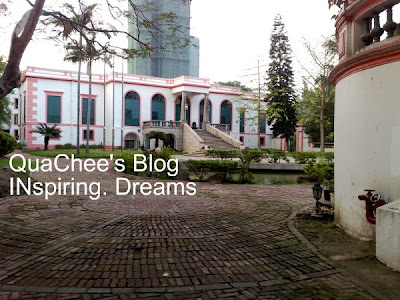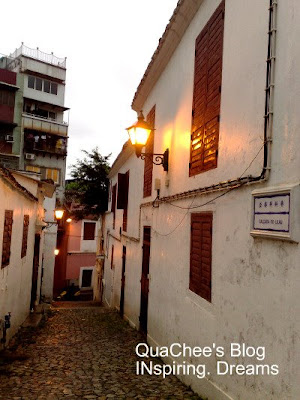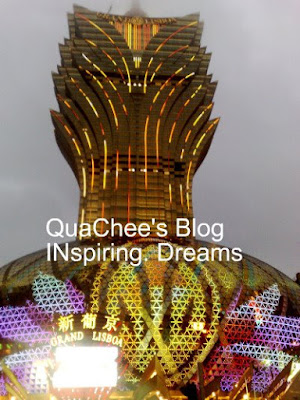One most likely do not come to Macau for its historical past... but will most likely still bump into a few of Macau's heritage sites.
Well, it makes sense, as this is no ordinary heritage sites... but in fact, when combined together, these sites are listed under the
Macau World Heritage. Yes, the
Historic Centre of Macau was successfully inscribed as a World Heritage Site in 2005, making it the 31st site in China to be granted this status.
Here are the many sites that makes Macau somewhat a unique China city.
1.
Senado Square
It's the heart of Macau for centuries, even till today. This place is so un-China, with its beautiful Meditarranean buildings that comes with interesting looking windows. And this is where modern & old somehow blend together (note: lots of shopping here).
2.
Ruins Of St. Paul
This magnificient blend of European and Chinese architecture is actually the facade of a burnt down church - Church Of St Paul (built in 1602-1640). But unlike any other still standing churches in Macau, this one seems to be the 'face' of Macau. Going to Macau without this photo makes one's trip incomplete.

And walking up the stairs towards the facade, just turn back and see the view of Macau - of the old buidlings in the front, and the many new structures at the back.
3.
Mount Fortress
This fortress built on Macao Hill is meant to be a defense to the Dutch invasion in 1622. This fort is actually just walking distance from the Ruins of St Paul, but it's not as crowded.

And it has a more rounded and better view of the city.

But what I like most of all is this cafe just at the foot of the fort. This rather cute old style cafe is well decorated as in the old times, with its blue-white tiles still intact.
4.
Lou Kau Mansion
It may not appeal from the outside, and I myself didn't know how special this building was at first... simply passing by, and only went in on the way back when I realised what it was.

If the outside of this Chinese merchan't mansion (built in 1889) is rather bland, but the inside is totally different, and quite grand. Beautifully refurbished, this mansion carries a fair bit of antique furniture.

The tall ceiling and wide space gives this mansion a spacious feel. Btw, this is a stationed person doing wood carving.
5.
Casa Garden
For another glimpse of the homes of the rich, there is Casa Garden... the former residence of a wealthy Portuguese merchant, Manuel Pereira (built in 1770).

Too bad that when I visited, the place was locked. But just from the exterior, one can know that this building will be another big house, and most likely beautifully restored as well (or if not yet, will definitely be when it is!).
6.
Dom Pedro V Theatre
Big tall pillars with 3 archways, each measuring 3 metres wide by 6 metres high, makes this performance centre another architectural icon in Macau.
The theatre is China's first western-style theatre. And interestingly till today, the place holds performances for the public (that is the time to actually see the inside).
7.
A Ma Temple
A-Ma Temple existed before Macau came into existence. The name Macau/ Macao is believed to derive from the Chinese
A-Ma-Gau meaning 'Bay of A-Ma' - which is where A-Ma Temple is located. This temple is an exemplary representation of Chinese culture inspired by Confucianism, Taoism, Buddhism and multiple folk beliefs.

For non Chinese, this temple would be quite an eye opener of what a small yet grand Chinese temple can look like. But even for the Chinese, the huge joss sticks with Chinese characters or the coil shaped joss sticks hanged on the ceilings make this a nice cultural view.

And if lucky, one can catch the Chinese opera, which when I went was held just in front of the temple.
8.
Lilau Square
This area comprise the first Portuguese residential quarters in Macau. Walking in this place again feels so different from the typical China city... with a feel of walking on a foreign land - and this is Macau.
9.
Moorish Barracks
Another interesting building with unique architecture, this building was constructed to accommodate an Indian regiment from Goa appointed to reinforce Macau’s police force.
The unique architecture style of Mughal influences adds to the many different archictectural influences in Macau.
10.
Sir Robert Ho Tung Library
This building initially built as residence for Dona Carolina Cunha (built in 1894). It was then purchased by Hong Kong businessman Sir Robert Ho Tung in 1918, as a retreat place during World War 2. He dontated the building as a library in his will in 1955.

This library is pretty cool - making all those new giant libraries to shame. Fist, it has a very welcoming courtyard. And the inner part of the library is quite modern - a good mix of conserving the old with modern times.
11.
Leal Senado Building
Just opposite the Senando Square is Macau’s original municipal chamber. The building unique architecture includes a coutryard garden, a grand ceremonial meeting room and a carved library styled after the library of Mafra Convent in Portugal (no photos allowed in the library), plus a small chapel.
Actually what draw me to this building is the old style tiles nicely decorated on the stairs leading to the library. Plus, one gets a good view of Senado Square at the opposite!
12 & 13.
Na Tcha Temple & Old City Wall
The petite temple situated just behind the Ruins of St. Paul’s is another example of 'multi cultural' & multi architectural Macau. Despite its size, this temple is really worth every shot of where size doesn't matter.
Beside it, lies a section of the Old City Wall. Apart from its time (built in 1569), this is similar to what the Portugese do in places they conquer.
Walking through the World Heritage zone in Macau sure is a long walk (took me 3 days in segments), but I think worth every moment. This walk made me appreciate Macau much more - it does show a more wholesome & different perspective of this China city, something that is much more rich & diverse in culture & architecture.
*There's many more buildings listed under the Macau World Heritage sites - including the many old & grand churches around the city. That is up next! :)
*I also passed by the
Mandarin house, but like a few buildings in the heritage zone, they were closed for renovations.
 St. Dominic's Church - it was here that the first Portuguese newspaper was published in China, A Abelha da China (The China Bee).
St. Dominic's Church - it was here that the first Portuguese newspaper was published in China, A Abelha da China (The China Bee). The inside of the church is much more grand with the the tall pillars & arches.
The inside of the church is much more grand with the the tall pillars & arches. St Lawrence's Church - one of the oldest churches in Macau (built in 1560, but this building is from 1846). I love this building for where it is located, not quite surrounded by many buildings around it - making it stand tall, on its own.
St Lawrence's Church - one of the oldest churches in Macau (built in 1560, but this building is from 1846). I love this building for where it is located, not quite surrounded by many buildings around it - making it stand tall, on its own. St. Anthony's Church - another one of Macau's oldest church, which was initially built on bamboo & wood (1560). However, this structure is rather new - 1930, after many reconstructions.
St. Anthony's Church - another one of Macau's oldest church, which was initially built on bamboo & wood (1560). However, this structure is rather new - 1930, after many reconstructions. St. Augustine's Church - the church that maintains the tradition of organising the Easter Procession through the city (I wonder how the already busy & colourful streets of Macau will look during this period). :)
St. Augustine's Church - the church that maintains the tradition of organising the Easter Procession through the city (I wonder how the already busy & colourful streets of Macau will look during this period). :) Holy House Of Mercy - this is not a church, but was built to house social welfare organisations (and which still functions till today).
Holy House Of Mercy - this is not a church, but was built to house social welfare organisations (and which still functions till today).










































